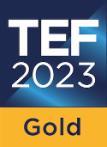Astrophysics and Chemistry - BSc (Hons)
Are you intrigued to discover how the Universe works and passionate about developing solutions to society’s global challenges? From saving habitats to contributing towards medical advances, our Astrophysics and Chemistry BSc will equip you with the advanced problem-solving, communication, data analysis and laboratory skills required to pursue further study or employment in a wide variety of sectors.
Year of entry
- 2025
Course type
- Combined Honours
UCAS code
- FF15
Duration of study
- 3 years / 4 years with international or placement year
Why study Astrophysics and Chemistry at Keele University?
Related courses
Accreditation and professional recognition
This programme is accredited by the Institute of Physics if physics is studied in all three years or the Royal Society of Chemistry if you specialise in Chemistry in your final year of study.
Teaching Excellence Framework GOLD
Keele University has been awarded the highest rating of gold in the teaching excellence framework (TEF), 2023. The TEF assessment identifies excellence in the educational experience and outcomes of our students, focusing on all undergraduate courses and students.

Additional opportunities
There are a range of additional opportunities available when studying this course.
Please note, undertaking one may impact upon the availability of another.
Entry requirements
The following section details our typical entry requirements for this course for a range of UK and international qualifications. If you don’t see your qualifications listed, please contact us to find out if we can accept your qualifications. If you don't think you'll meet the entry requirements specified, you may be able to gain entry to this course via a Foundation Year.
Typical offer
Please ensure that you read the full entry requirements by selecting your qualifications from the dropdown menu below. This will include any subject specific, GCSE/Level 2 Maths, and English language requirements you may need.
Please select your qualification from the drop-down list below for the full entry requirement information
A Level
ABB in three A levels including B in Chemistry and B in Maths or Physics.
Contextual Offer: BBC in three A levels including B in Chemistry and B in Maths or Physics.
You will also need: 6 / B in GCSE Maths or Level 2 Functional Skills Maths, plus an English language qualification (see below).
BTEC Extended Diploma / National Extended Diploma
DDM in any of the following BTEC Extended Diplomas / National Extended Diplomas:
Applied Science, including completion of three out of four of the following units: Applications of Organic Chemistry, Applications of Inorganic Chemistry, Industrial Chemical Analysis, Practical Chemical Analysis.
Contextual Offer: DMM in any of the following BTEC Extended Diplomas / National Extended Diplomas:
Applied Science, including completion of three out of four of the following units: Applications of Organic Chemistry, Applications of Inorganic Chemistry, Industrial Chemical Analysis, Practical Chemical Analysis.
You will also need: 6 / B in GCSE Maths or Level 2 Functional Skills Maths, plus an English language qualification (see below).
BTEC National Diploma / Diploma
Distinction and Merit in Applied Science BTEC National Diploma / Diploma including completion of three out of four of the following units: Applications of Organic Chemistry, Applications of Inorganic Chemistry, Industrial Chemical Analysis, Practical Chemical Analysis, and B in Maths or Physics A level.
You will also need: 6 / B in GCSE Maths or Level 2 Functional Skills Maths, plus an English language qualification (see below).
BTEC National Extended Certificate / Subsidiary Diploma
Distinction in any BTEC National Extended Certificate / Subsidiary Diploma and BB in two A Levels including B in Chemistry and B in Maths or Physics.
You will also need: 6 / B in GCSE Maths or Level 2 Functional Skills Maths, plus an English language qualification (see below).
T Level
Distinction in any of the following T Levels: Science, with specialism in Laboratory Sciences
You will also need: 6 / B in GCSE Maths or Level 2 Functional Skills Maths, plus an English language qualification (see below)
International Baccalaureate Diploma
655 in three Higher Levels including 5 in Chemistry and 5 in Maths (any) or Physics, or 32 points including 5 in Chemistry and 5 in Maths (any) or Physics.
Contextual Offer: 554 in three Higher Levels including 5 in Chemistry and 5 in Maths (any) or Physics, or 29 including 5 in Chemistry and 5 in Maths (any) or Physics.
You will also need: 6 / B in GCSE Maths or Level 2 Functional Skills Maths, or 5 in IB Middle Years Maths, or 4 in IB Diploma Standard Level Maths (any), plus an English language qualification (see below).
International Baccalaureate Career-Related Programme
We encourage applications with the IBCP but recognise that your combination of qualifications may differ depending on where you are studying.
If you are taking a BTEC National Diploma / Diploma with one or more Higher Levels, your offer will be similar to our BTEC + A level offer (see 'BTEC National Diploma / Diploma') but with an HL requirement of 6 for A, 5 for B, or 4 for C.
For any other combination, please contact the University Admissions Team for advice.
Access to HE Diploma
128 UCAS points in an Access to HE Diploma with Chemistry and Physics or Maths related content, including Distinction in at least 30 Level 3 credits. Please contact the University Admissions Team for advice on whether your chosen course would qualify.
You will also need: 6 / B in GCSE Maths or Level 2 Functional Skills Maths, plus an English language qualification (see below).
Welsh Baccalaureate / Bagloriaeth Cymru
The Advanced Skills Challenge Certificate is equivalent to one full A Level at the same grade and can be included alongside 2 other A Levels in a standard A Level offer for this course (see A Level). All subject specific requirements will still need to be met.
Scotland - Highers and Advanced Highers
BBBBC in five Highers including Chemistry and Maths or Physics Higher, or BC in two Advanced Highers and CC in two Highers including Chemistry and Maths or Physics Higher or Advanced Higher, or BCC in three Advanced Highers including Chemistry and Maths or Physics Advanced Higher.
You will also need: B in National 5 Maths, or 6 / B in GCSE Maths or Level 2 Functional Skills Maths, plus an English language qualification (see below).
Extended Project Qualification (EPQ)
If you have B or higher in the EPQ and are studying A Levels, BTEC, the International Baccalaureate Diploma, or an Access to HE Diploma, you will typically receive an alternative offer which will be lower than the standard offer. Please see 'Alternative and contextual offers' below.
Core Maths
If you have B or higher in Core Maths and are studying A Levels, BTEC, the International Baccalaureate, or an Access to HE Diploma, you will typically receive an alternative offer which will be lower than the standard offer. Please see 'Alternative and contextual offers' below.
Ireland - Leaving Certificate
H3, H3, H3, H4, H4, H4 in the Irish Leaving Certificate including H4 in Chemistry or Physics and Chemistry (combined) and H4 in one of Maths, Physics or Physics and Chemistry (combined).
You will also need: O3 / H6 in Maths, plus an English language qualification (see below).
China - Gaokao
75% in the Gaokao including 70% in Chemistry and 70% in Maths or Physics.
You will also need: 65% in Senior Secondary School or Gaokao Maths, plus an English language qualification (see below).
India - Standard XII
Average of 75% from four subjects including 70% in Chemistry and 70% in Maths or Physics in the ICSE, CBSE or Western Bengal Standard XII, or average of 80% from four subjects including 75% in Chemistry and 75% in Maths or Physics in any other Standard XII.
You will also need: 7 or C1 in Secondary School Examination Maths, or Pass in Standard XII Maths, plus an English language qualification (see below).
Germany - Abitur
2.0 overall average in the Abitur including 12 in Chemistry and 12 in Maths or Physics.
You will also need: 11 in Maths in the Abitur, plus an English language qualification (see below).
France - Baccalaureate
14 in the French Baccalaureate / International Option Baccalaureate including 14 in Chemistry / Physics, or 13 in the Baccalauréat Français International including 13 in Chemistry / Physics.
You will also need: 11 in Maths in the Baccalaureate, plus an English language qualification (see below).
Hong Kong - Diploma
544 from two electives and one core subject in the HKDSE including 4 in Chemistry and 4 in Maths or Physics.
You will also need: 3 in HKDSE Maths, plus an English language qualification (see below).
Spain - Bachillerato
Overall average of 7.8 in the Título de Bachillerato including 8 in Chemistry and 8 in Maths or Physics.
You will also need: 6 in Graduado en Educación Secundaria (GES) Maths or 6.5 in Título de Bachiller Maths, plus an English language qualification (see below).
Italy - Diploma di Esame di Stato
85% in the Esame di Stato including 8 in Chemistry and 8 in Maths or Physics.
You will also need: 6 in Maths in the Diploma, plus an English language qualification (see below).
Cyprus - Apolytirion
18.5 / 88% in the Apolytirion including 18 in Chemistry and 18 in Maths or Physics.
You will also need: 15 in Maths in the Apolytirion, plus an English language qualification (see below).
Portugal
Overall average of 16 in a secondary certificate including 16 in Chemistry and 16 in Maths or Physics.
You will also need: 11 in secondary certificate Maths, plus an English language qualification (see below).
Canada - Diploma
70% / BBBBC in five courses in the Grade 12 Diploma including 70% in Chemistry and 70% in Advanced Functions, Calculus and Vectors or Physics.
You will also need: 60% in Grade 11 Maths, plus an English language qualification (see below).
Kenya - KCSE / Diploma
We do not accept the Kenya Certificate of Secondary Education for direct entry. However, you can apply to study an International Foundation Year at Keele University International College. On successful completion, you can progress to an undergraduate degree at Keele.
We may accept a two year Diploma. Please contact the University Admissions Team for advice.
Nigeria - Senior School Certificate / OND
We do not accept the Senior School Certificate (WAEC or NECO) for direct entry. However, you can apply to study an International Foundation Year at Keele University International College. On successful completion, you can progress to an undergraduate degree at Keele.
We may accept an Ordinary National Diploma with GPA of 2.5 or a Merit / Lower Credit. Please contact the University Admissions Team for advice.
USA - Advanced Placement
544 from three Advanced Placement subjects including 4 in Chemistry and 4 in Calculus (either) or Physics (1 or 2).
You will also need: B in Grade 12 High School Diploma Maths, plus an English language qualification (see below).
Ghana
We do not accept the West African Senior School Certificate Examination for direct entry. However, you can apply to study an International Foundation Year at Keele University International College. On successful completion, you can progress to an undergraduate degree at Keele.
Sri Lanka - Advanced Level
ABB in three Advanced levels including B in Chemistry and B in Combined Maths or Physics.
You will also need: B in O-level Maths, plus an English language qualification (see below).
Malaysia - STPM
ABB in three Principal level subjects in the STPM including B in Chemistry and B in Maths or Physics.
You will also need: B in SPM Maths, plus an English language qualification (see below).
Pakistan - Secondary School Certificate
We do not accept the Secondary School Certificate for direct entry. However, you can apply to study an International Foundation Year at Keele University International College. On successful completion, you can progress to an undergraduate degree at Keele.
Singapore - A Levels (H2)
ABB in three H2 Levels including B in Chemistry and B in Combined Maths or Physics.
You will also need: B in O-level Maths, plus an English language qualification (see below).
European Baccalaureate
75% overall with 7 in Chemistry and 7 in Maths (5 period) or Physics.
You will also need: 6.5 in European Baccalaureate Maths, plus an English language qualification (see below).
NCUK
Pass NCUK Foundation Year with ABB including B in Chemistry and B in Mathematics or Physics. Grade C in EAP English Language module.
You will also need: 6 / B in GCSE Maths or international equivalent.
Uganda - Advanced Certificate of Education
ABB in three Principal level subjects in the Advanced Certificate of Education including B in Chemistry and B in Maths or Physics.
You will also need: 4 in UACE or UCE Maths, plus an English language qualification (see below).
Zimbabwe - Advanced Level GCE
ABB in three Advanced Level subjects including B in Chemistry and B in Maths or Physics.
You will also need: 6 / B in GCSE Maths or Level 2 Functional Skills Maths, plus an English language qualification (see below).
English language requirements
All of our courses require an English language qualification or test. For most students, this requirement can be met with a 4 or C in GCSE English. Please see our English Language guidance pages for further details, including English language test information for international students. For those students who require an English language test, this course requires a test from Group A.
Alternative and contextual offers
We're committed to ensuring equality of opportunity to all our applicants with the potential and motivation to succeed, regardless of background. That's why we operate a range of alternative offer schemes with clear eligibility criteria, including contextual offers, offers for those studying within the Keele region, and recognising a range of additional qualifications in your offer.
General information
The entry grades outlined in this section indicate the typical offer which would be made to candidates, along with any subject specific requirements. This is for general information only. Keele University reserves the right to vary offer conditions depending upon a candidate's application.
.jpg)
Researchers studying the universe's secrets secure combined £1.5m in funding
Academics from Keele’s Astrophysics Research Centre have secured funding from UK Research and Innovation’s Science and Technology Facilities Council for three new studies, to be carried out over the next three years. The researchers will be studying issues including nuclear astrophysics, the structure and ages of stars, and the formation of star clusters.
Read the full Keele Astrophysics research funding news article
Facilities
Develop your practical skills in Keele's state-of-the-art Central Science Laboratories
Central Science Laboratories
Practical teaching will take place in Keele’s state-of-the-art Central Science Laboratories (CSL). In Chemistry you will have access to a wide variety and high volume of industry-standard equipment that is housed within a space designed to encourage and enable collaborative and interdisciplinary working. We continue to invest in high quality equipment and instrumentation to an industry standard. You will be trained how to use research level equipment from the first semester of your first year. This means you will be familiar with the type of instrumentation you may use in your career within the field.
Equipment
Equipment you may use includes: Nuclear magnetic resonance spectroscopy (NMR), X-ray diffractometers (powder and single-crystal), infra-red spectrometers, UV-Vis spectroscopy, Raman spectrometer, Fluorescence spectroscopy, Quadrupole time of flight liquid chromatography mass spectrometer (Q-TOF), gas chromatography-mass spectrometry (GC-MS) and high-performance liquid chromatography (HPLC).
Keele Observatory
To apply the theory you have learnt during your studies, practical classes will include time spent in our observatory. Founded in 1962 to host a 31cm refracting telescope dating back to 1874, it has since acquired a 60cm reflecting telescope for research, and undergone significant refurbishment.
Find out more about Keele Observatory

"As a Fraud Analyst, I use the skills I developed as an astrophysics undergraduate to identify and solve complex problems"
Sector-leading in sustainability education
At Keele we're leading the sector in sustainability, not just in our ambitions to become carbon neutral by 2030 but also through our teaching and our ground-breaking research into climate change and renewable technologies. In 2021 we were awarded the prestigious title of Global Sustainability Institution of the Year (International Green Gown Awards, 2021). Within the School of Chemical and Physical Sciences our award winning staff promote sustainability through their teaching to raise awareness of the environmental issues within chemistry.
Find out more about Keele’s commitment to sustainability.

"The staff are friendly and approachable and made every effort to ensure that you achieved the best results, whether that’s exams, coursework, practical sessions, or professional development. The practical’s covered all aspects of chemistry and ensured that we developed all the necessary technical skills to pursue any field. Overall, I had an amazing time at Keele and am grateful to all those that made it such."
Foundation year
Our Foundation Year provides an excellent alternative route to Keele, providing a unique opportunity to better prepare for your chosen degree, and with guaranteed entry onto your undergraduate course once you successfully complete your Foundation Year.
This extra year of study can improve your academic skills, expand your subject knowledge, give you a better understanding of higher education and, perhaps most importantly of all, build your confidence.
Keele University is consistently ranked among the top universities for student satisfaction, and we have over 70 years' experience of teaching a foundation year to students. On the Keele Foundation Year, you'll study on campus, joining our undergraduate community from the outset, with access to all the facilities and support that you'd get as an undergraduate student at Keele.
The information in this Foundation Year section is for UK/Home applicants. Where an international Foundation Year is available, please see the 'Information for international students' tab.
Course Content
Our Foundation Year allows you to develop your critical thinking, academic reading, writing, and communication study skills along with subject-specific knowledge and skills. Upon meeting the progression criteria and successfully completing our Foundation Year, you will automatically progress into your Keele undergraduate degree with the confidence that you have the skills, and knowledge needed to successfully complete your course.
The Keele Foundation Year is a two semester programme that provides a tailored pre-degree programme of study to better prepare you for the BSc (Hons) Astrophysics and Chemistry degree. For example, the Foundations of Physics module will introduce you to the mathematical skills needed to solve problems in physics at level 3 while studying fundamental equations and concepts in classical physics. In addition, the Advancing Chemsitry module aims to increase your knowledge and understanding of the principles and concepts of chemistry in a theoretical context, while also demonstrating the application of concepts in a practical environment. All of the modules you take will prove useful in your degree and professional career. Course content has been developed in collaboration with degree teaching teams, so that by the time you begin Year 1, you will be ready to excel at your studies, as the majority of our Foundation Year students do.
Find out more about the Keele Foundation Year, including information about teaching and assessment methods by visiting the Foundation Year homepage.
Course Structure
The module details given below are indicative, they are intended to provide you with an idea of the range of subjects that are taught to our current students. The modules that will be available for you to study in future years are prone to change as we regularly review our teaching to ensure that it is up-to-date and informed by the latest research and teaching methods. The information presented is therefore not intended to be construed and/or relied upon as a definitive list of the modules available in any given year.
Semester One Modules
| FYO-00185 | Practical and Academic Skills in Science | 15 credits |
| FYO-00215 | Foundations of Mathematical Methods | 15 credits |
| FYO-00189 | Foundations of Chemistry | 15 credits |
| FYO-00205 | Foundations of Physics | 15 credits |
Semester Two Modules
| FYO-00209 | Advancing Physics | 15 credits |
| FYO-00231 | Advancing Mathematical Methods | 15 credits |
| FYO-00191 | Advancing Chemistry | 30 credits |
Entry requirements
The entry grades outlined in this section indicate the likely offer or range of offers which would be made to candidates along with any subject specific requirements. This is for general information only. Keele University reserves the right to vary offer conditions depending upon a candidate’s application. Read more about our undergraduate entry requirements.
- 56 UCAS points including at least one Level 3 qualification (such as an A Level, BTEC, Access Course, or T Level)
- Plus C in GCSE English / Level 2 Functional Skills English and C in GCSE Maths / Level 2 Functional Skills Maths
How to apply
Students will need to apply for BSc (Hons) Astrophysics with Foundation Year (UCAS code: F513) through UCAS at www.ucas.com. You will then be contacted to confirm your second subject by a member of our team.
Direct entry students
If you already have your qualifications, are not expecting any further results and only wish to apply to Keele, please contact the Admissions Office directly.
The information in this Foundation Year section is for UK/Home applicants. Where an international Foundation Year is available, please see the 'Information for international students' tab.
We also offer a January start for some of our Foundation Year courses. Adopting a blended learning approach, the January start is particularly useful for students wishing to return to education following time out of studying, or who are seeking a flexible approach to their Foundation Year studies. Our January start is available across most of our Science, Humanities, Social Science and Business courses.
Whilst still being a full-time course, our blended delivery model combines live teaching sessions - both online and on-campus - with self-directed study, enabling you to predominantly study at a time that suits your lifestyle. You will benefit from weekly online taught sessions which encourage you to engage with your teachers and peers.
In addition to online study there will be a series of full study days that you will be required to attend throughout each semester. These sessions may include lab-based activities, group work, review of course and assessment materials studied online. They will emphasise opportunities for you to deepen your knowledge and understanding of your chosen route.
Please refer to the September start tab for more information about the entry requirements and what you will study. The modules that you will take on a January start Foundation Year will be similar to those for the September start, but on a compressed timescale and tailored to a blended learning approach (with the majority of learning taking place online).
For more information, including fees, the UCAS code for this course, how to apply, and how you will be taught, please visit our January Start Foundation Year webpage.
Our International Foundation Year is delivered on campus through Keele University International College (KUIC). Find out more about the International Foundation Year options on the KUIC website.
Discover the Keele difference
Everything’s on your doorstep at Keele, and you’ll soon feel at home and make friends wherever you go.
We help students manage their money and ensure that they receive any funding for which they may be eligible.
Make yourself more employable after graduation by taking advantage of the whole host of additional opportunities.





